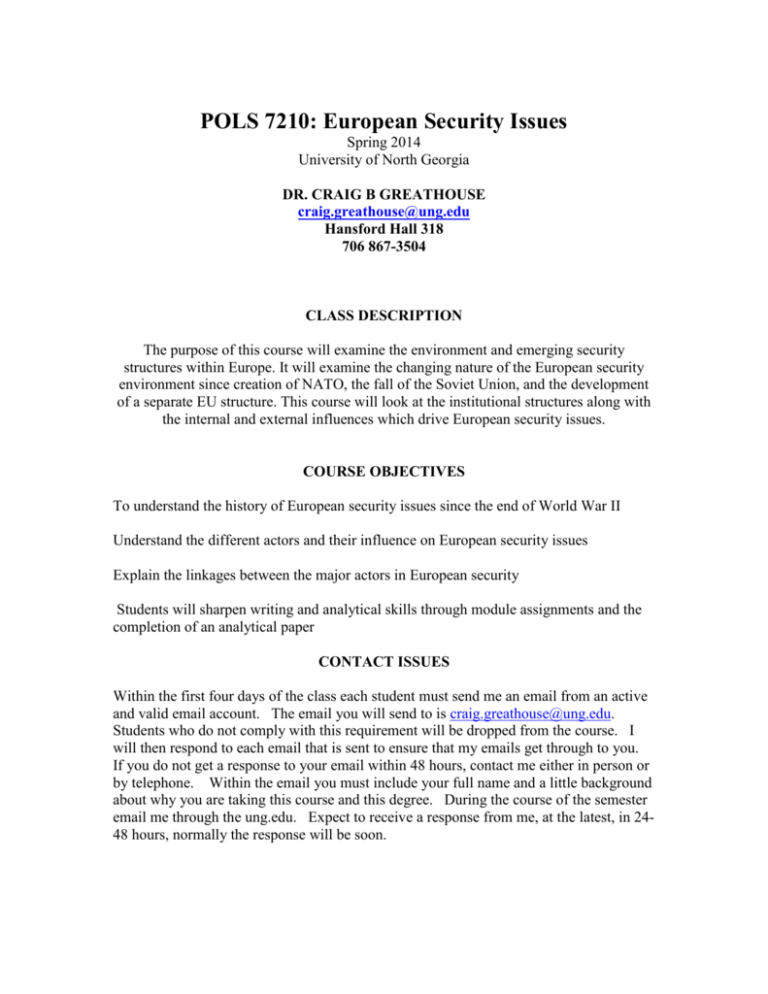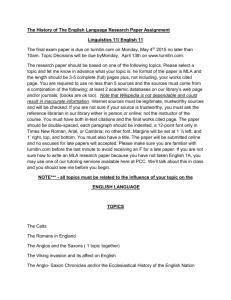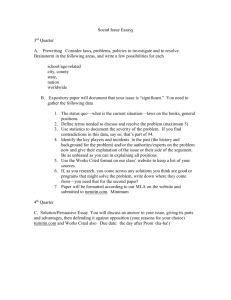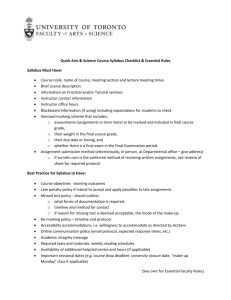POLS 7210: European Security Issues
advertisement

POLS 7210: European Security Issues Spring 2014 University of North Georgia DR. CRAIG B GREATHOUSE craig.greathouse@ung.edu Hansford Hall 318 706 867-3504 CLASS DESCRIPTION The purpose of this course will examine the environment and emerging security structures within Europe. It will examine the changing nature of the European security environment since creation of NATO, the fall of the Soviet Union, and the development of a separate EU structure. This course will look at the institutional structures along with the internal and external influences which drive European security issues. COURSE OBJECTIVES To understand the history of European security issues since the end of World War II Understand the different actors and their influence on European security issues Explain the linkages between the major actors in European security Students will sharpen writing and analytical skills through module assignments and the completion of an analytical paper CONTACT ISSUES Within the first four days of the class each student must send me an email from an active and valid email account. The email you will send to is craig.greathouse@ung.edu. Students who do not comply with this requirement will be dropped from the course. I will then respond to each email that is sent to ensure that my emails get through to you. If you do not get a response to your email within 48 hours, contact me either in person or by telephone. Within the email you must include your full name and a little background about why you are taking this course and this degree. During the course of the semester email me through the ung.edu. Expect to receive a response from me, at the latest, in 2448 hours, normally the response will be soon. YOU ARE ONLY TO USE MY UNG EMAIL IN CONTACTING ME REGARDING THIS CLASS. Do not use the email in D2L to contact me as it is not as effective. I will not respond to the D2L email CODE OF CONDUCT For this course the code of conduct that is articulated in the student handbook serves as the rules for this class. Violations will be dealt with by the instructor and may be elevated to the Departmental Chair and or Dean of Students for additional action. All options remain open to the instructor up too and including an administrative withdrawal from this class are possible ATTENDANCE POLICY: Since this is a web-based course, there is no attendance that is required for this class. You work on your own time and focus on getting the assignments in on time. Academic Integrity Policy The honor code, “On my honor, I will not lie, cheat, steal, plagiarize, evade the truth or tolerate those who do,” reflects UNG’s commitment to academic integrity. The policies and procedures regarding academic integrity at UNG are included in the Student Handbook under Student Code of Conduct. The absence of an integrity code statement on an assignment, the absence of a written honor pledge on an assignment, or the absence of a student’s signature in no way releases the student from the responsibility to know, understand, and follow the university’s honor policy. Suspected violations of the Academic Integrity policy will be referred by students to the instructor. If the instructor concludes that a violation of the Academic Integrity policy has occurred, the instructor will penalize the student and file an incident report. If an incident report is filed by the instructor, the instructor will review the completed report with the student and will request that the student sign the report as an indication that the student is aware of the contents of the report. PLAGIARISM IF YOU ARE CAUGHT PLAGARISING IN THIS COURSE, YOU WILL RECEIVE AN F FOR THE COURSE. YOU WILL THEN BE FORWARDED TO THE ACADEMIC INTEGRITY COUNCIL FOR FURTHER ACTION. I DO NOT TOLERATE PLAGARISM IN ANY WAY SHAPE OR FORM. PLAGIARISM DEFINED - is using others' ideas and words without clearly acknowledging the source of that information. Plagiarism is offering someone else's work as your own, whether one sentence or whole paragraphs, and whether from an internet source, book, periodical, or the writing of other students. . It also includes turning in work submitted for another class, in full or in part, without the expressed permission of the course instructor. Intent is not germane in my determination of plagiarism. If you use the ideas or words of others without citing you are guilty of plagiarism. If you are not sure whether to cite something or not cite it to protect yourself. It is better to over cite then not to cite enough. If you have questions ask me. Turnitin Statement Students agree that by taking this course all required papers may be subject to submission for textual similarity review to Turnitin.com for the detection of plagiarism. All submitted papers will be included as source documents in the Turnitin.com reference database solely for the purpose of detecting plagiarism of such papers. Use of the Turnitin.com service is subject to the Terms and Conditions of Use posted on the Turnitin.com site. You will be submitting all of your assignments to Turnitin for a plagiarism check. More information will be provide on how access turnitin for this course in D2L. In addition the instructor may use other approaches such as Google searches in addressing suspected plagiarism. METHODS OF INSTRUCTION This course will be conducted online using a combination of written assignments along with discussion on the discussion boards. Students are expected to be fully involved in the discussion sections and in submitting their written work. This course is reading intensive. The readings you have been assigned are important texts in the field. Reading and understanding them is the basis of learning in this course. You be asked, at the end of each module, to answer a synthesis question where you will then synthesize the readings and show your understanding of them. You will also be asked to participate in discussions on the discussion board over that sections assignment. Questions about the readings and discussion of the reading will occur on the discussion board. TESTING AND GRADING SPECIFICS ABOUT HOW TO SUBMIT ASSIGNMENTS You are to use Microsoft word (doc or docx files) or PDF’s for all projects that will be turned in for this course. The answers for each assignment are to be in one document. ALL PAPERS MUST BE UPLOADED TO TURNITIN.COM OR THEY WILL NOT BE GRADED. ALL UPLOADS MUST OCCUR BY NOON ON THE DATE THE ASSIGMENTS ARE DUE. FAILURE TO UPLOAD ON TIME WILL RESULT IN YOUR ASSIGNMENT NOT BEING GRADED TECHNICAL GLITCHES ARE NOT THE FAULT OF THE INSTRUCTOR AND WILL NOT BE CONSIDERED A VALID REASON WHY THE ASSIGNMENT WAS NOT UPLOADED. STUDENTS ARE RESPONSIBLE FOR ENSURING THAT THAT THEY UPLOAD THE CORRECT VERSION OF THEIR PAPER. These assignments should be fully spell checked and I would also recommend using grammar check. Poorly edited answers will have deductions due to spelling or grammatical errors. You MUST then also submit your document to turnitin.com by NOON on the day the assignment is due. At the top of the first page of your assignment you are to include your full name and the question for the assignment. NO LATE TERM PAPERS OR OTHER ASSIGNMENTS WILL BE ACCEPTED!!!!! I will be grading you based on the rubric which you can find in D2L under the additional information folder. All grading will be done within turnitin.com using the grademark element of the website. You will be able to see the comments to your papers posted in turnitin.com. MISSED ASSIGNMENTS Due to the nature of an online course, I will not be accepting missed, past due, or late assignments unless there is a significant reason. Going to the doctors is not going to be an acceptable excuse. Being in the hospital would qualify but only if there is documentation for the hospital stay. Given the fact that you do not have to be in class at a particular time and can do your work at any time the responsibility falls on the student to make sure the assignment gets turned in. Going out of town would not qualify without significant extenuating circumstances. TECHNOLOGY ISSUES It is the student’s responsibility to make sure that the assignments get to me. Computer problems and technology failures must be addressed by the students themselves. One thing you do need to watch for when working with D2L is pop up blockers. Make sure that when you are in D2L that your pop up blocker is turned off. GRADING NO LATE TERM PAPERS OR OTHER MAJOR ASSIGNMENTS WILL BE ACCEPTED!!!!! Grading in the course will be based on the university’s grade distribution. A’s = 90-100% - exceptional work B’s = 80-89% – good work C’s = 70-79% – average work D’s = 60-69% – below average F’s = 59% and below – failing Your final grade in the course is determined by an average of all work done during the semester. The percentage is figured by adding the total points a student earned divided by the total points in the class. At times an assignment or grading element may have a greater or lesser weight than other work done during the semester. If this is the case you will be informed and the grade will be calculated with that in mind. Quizzes may not be specifically scheduled in a syllabus but I retain the right to quiz students at any time I see fit. I consider cheating on tests or papers to be a major violation of the academic integrity policy. Therefore, if you are caught cheating you will be given an F for the semester and your case referred to for further action. The grades for this class will be determined by the following criteria this semester. There will be 6 modules focusing on different issues related to American national security policy. For each of these modules the student will be expected to be a contributor to the discussion boards about the topic. For each module a student can earn up to 30 points for active and competent participation on the discussion boards. If there is one discussion topic it will be worth 30 points if there are two discussion topics they will each be worth 15 points. You must have your initial posting for EACH thread is due normally the first Monday after the module starts. However there may be an exception so check the schedule for specific dates. You then must respond to two other student’s initial postings in each thread during the rest of the module as well as respond to questions or issues raised on your initial postings. More detailed information can be found in the criteria for discussion boards document found in the additional information folder. For this class there will be a total of 180 points possible from the discussion boards. At the end of each module each student will answer one question which will synthesize the information within the module and one question and look at issues of application. Each question will be worth 50 points per module. There will be a total of 300 points possible for synthesis and application question. IF you do not synthesize the different sources used within the context of the module you will be marked down heavily. I expect each source to be used in answering the question posed. Remember this is synthesis I do not want to see just an overview of ideas or themes. You have to point out where connections or disagreements between the different authors exist. Each of these synthesis papers is to be between 4-6 pages of content. By content I mean actually answering the question, title pages and bibliographies do not count for this page limit. You may only exceed the content limit by up to two pages. If I get an answer which is longer than 8 pages I stop reading and you are graded on what I have read. You may bring in outside sources but they must be relevant and academic in nature. The due dates for each synthesis assignment are shown in the schedule they are due by NOON on the posted day. You will have one shorter paper which will be due by March 10, 2014. This paper will be 6-8 pages of content. You will use one of the chapters listed below from the Snyder book to as the basis for this paper. You will examine one of these topics in relation to European security. You must use 10 academic sources outside of any of those listed in this class. You may NOT use the topic you use for this paper as the same topic for your larger paper. Environmental Security Human Security Security Implications of the Arms Trade The Causes of War Military Strategy and the New World Order The Transformation of War Nuclear Strategy Challenges and Opportunities for the Nuclear Non-Proliferation Regime Terrorism and Insurgency Intervention: The Utility of Force in International Politics Great Powers and the International System: Between Unilateralism and Multilateralism Your final project will be worth 150 points. This will be a research paper of between 2025 pages addressing one of the topics from the class in terms of European security. You will select a topic, which must be approved by the instructor, and apply the topic to a situation or event in the world. You are going to apply what you have learned to fully explaining the topic and then offering suggestions about how the event could have been avoided and future options for the event. There will be 705 points available in this course. 180 discussion boards 300 module answers 75 first paper 150 research paper Technical Requirements which students will need to understand in order to effectively participate in this class. If you have issues or problems with any of these elements please contact me via email at craig.greathouse@ung.edu. 1. Ability to use email and attachments 2. The ability to use and submit materials via Microsoft word or in PDF format 3. Ability to sign into D2L TURNITIN.COM INFORMATION Class ID = 7441964 Class password = europe Prerequisites for POLS 7230 There are no prerequisites once a student is accepted into the MAIA REQUIRED BOOKS Snyder, Craig A. 2012. Contemporary Security and Strategy 3rd Edition. Palgrave Tardy, Thierry. 2009. European Security in a Global Context. Routledge. MODULE # 1: Concepts and Definitions of Security MODULE # 1 Start 1-13-14..ends 1-27-14 Required Readings Walt, Stephen.(1991). The Renaissance of Security Studies. International Studies Quarterly, Vol. 35, No. 2. pp. 211-239. Kolodziej, Edward. (1992) The Renaissance of Security Studies: Caveat Lector. International Security Studies. 36 pp. 421-438. Mathews, J. (1989). REDEFINING SECURITY. Foreign Affairs, 68(2), 162-177. Williams, M. C. (2003). Words, Images, Enemies: Securitization and International Politics. International Studies Quarterly, 47(4), 511 Snyder Chapter 1 ( recommend 2 and 3 as well) DISCUSSION QUESTIONS Initial posting by 1-20-14 All responses by 1-27-14 SYNTHESIS QUESTION – due by 1-27-14 at noon Security questions within the European region have been an essential concern in the international system for hundreds of years. The transition into the post-Cold War period of security for the European region has caused some commentators to assert that European security concerns are not as important as other regional areas. Using either a “broad” or “narrow” definition of security make an argument about whether European matters to the level of other regions in the system? You must defend your notion of security either broad or narrow. In making this argument you must also define what Europe incorporates and show how that definition affects European Security. MODULE # 2: History of European Security Starts 1-27-14 Ends 2-10-14 REQUIRED READINGS Greathouse power points and essay Hettne, Bjorn. 1991. Security and Peace in the Post Cold War Europe. Journal of Peace Research. 28(3) 279-294 Roter, Petra and Zlatko Sabic. 2004. New and Old Europe in the Context of the Iraq War and its implication for European Security. Perspectives on European Politics and Society. 53: 517-542. Treverton, G. F. (1991). Elements of a new European security order. Journal Of International Affairs, 45(1), 91. Trofimenko, H. (1991). Pan-European security: A Soviet scholar's view. Journal Of International Affairs, 45(1), 113 DISCUSSION QUESTIONS Initial posting by 2-3-14 All responses by 2-10-14 SYNTHESIS QUESTION – due 2-10-14 at noon in turnitin.com The historical issues of European security (since the end of World War II) have been affected by the Cold War, fall of the Berlin Wall, the breakup of Yugoslavia, and role of NATO. Of these four different elements which would you argue is the most important in the current element of European security? MODULE # 3: NATO Module 3 starts 2-10-14 Ends 2-24-14 Required Reading NATO in Focus: An Introduction to the Transatlantic Alliance NATO: A Short History Berlin Plus Agreements Berdal, M., & Ucko, D. (2009). NATO at 60. Survival (00396338), 51(2), 55-76. Together for Security: An Introduction to NATO NATO/EU Consultation Mattelaer, A. (2011). How Afghanistan has Strengthened NATO. Survival (00396338), 53(6), 127-140. Tardy Ch 2 DISCUSSION QUESTIONS Initial posting by 2-17-14 All responses by 2-24-14 SYNTHESIS QUESTION – due 2-24-14 at noon in turnitin.com Does NATO still matter for European security? Why or why not? MODULE # 4: European Union MODULE 4 – start 2-24-14 ends 3-10-14 Required readings Greathouse essay on strategic culture CSDP: Between internal constraints and external challenges (structure overview / skim) ESDP the first 10 years (structures/skim) ESDP the first 5 years (background skim) ESS: European Security Strategy 2003 European Council Conclusions CSDP 2013 Helsinki European Council Conclusions Implementing ESS 2008 update Menon, A. (2011). European Defence Policy from Lisbon to Libya. Survival (00396338), 53(3), 75-90. St. Malo Declaration 1998 Mathiopoulos M, Gyarmati I. Saint Malo and beyond: Toward European defense. Washington Quarterly [serial online]. September 1999;22(4):65 Winn, N. (2003). Towards a Common European Security and Defence Policy? The Debate on NATO, the European Army and Transatlantic Security. Geopolitics, 8(2), 4768. Treaty on European Union (TEU) provisions on Common Foreign and Security Policy Tardy Ch 1 and 4 DISCUSSION QUESTIONS Initial posting by 3-3-14 All responses by 3-10-14 SYNTHESIS QUESTIONS: due 3-10-14 at noon in turnitin.com The notion of a unified European security actor, in the form of the EU, is something that has been sought since the end of World War II. The question is can the EU become an effective security actor without holding complete sovereignty in terms of defense and security policy given the wide diversity of members and their views on security? Term paper one due March 10, 2014 by NOON in turnitin.com MODULE # 5 Russia Starts 3-10-2014 Ends 3-31-2014 Required Readings Antonenko, O. (2009). Towards a comprehensive regional security framework in the Black Sea region after the Russia-Georgia war. Journal Of Southeast European & Black Sea Studies, 9(3), 259-269. Sherr, J. (2011). Hard power in the Black Sea region: a dreaded but crippled instrument. Journal Of Southeast European & Black Sea Studies, 11(3), 279-298 Makarychev, A., & Morozov, V. (2011). Multilateralism, Multipolarity, and Beyond: A Menu of Russia's Policy Strategies. Global Governance, 17(3), 353-373. Antonenko, O., & Giegerich, B. (2009). Rebooting NATO-Russia Relations. Survival (00396338), 51(2), 13-21. Rumer, E., & Stent, A. (2009). Russia and the West. Survival (00396338), 51(2), 91-104. Larrabee, F. (2010). RUSSIA, UKRAINE, AND CENTRAL EUROPE: THE RETURN OF GEOPOLITICS. Journal Of International Affairs, 63(2), 33-52. Renz, B., & Thornton, R. (2012). Russian Military Modernization. Problems Of PostCommunism, 59(1), 44-54 Igumnova, L. (2011). Russia's Strategic Culture Between American and European Worldviews. Journal Of Slavic Military Studies, 24(2), 253-273. Snetkov, A. (2012). When the Internal and External Collide: A Social Constructivist Reading of Russia's Security Policy. Europe-Asia Studies, 64(3), 521-542. Tardy Ch 5 DISCUSSION QUESTIONS Initial posting by 3-24-14 All responses by 3-31-14 SYNTHESIS QUESTIONS: due by 3-31-14 at noon in turnitin.com Russia is clearly a major security actor in the international system, however the question becomes how much influence and where is that influence in terms of the European region? How is Russia positioned to achieve its security outcomes versus the EU and NATO and how much of a sphere of influence will they be able to maintain in face western influence? MODULE # 6 Cases MODULE 6 – starts 3-31-14 Ends 4-14-14 Required Reading Arbatova, N. (2001). European Security after the Kosovo Crisis: The Role of Russia. Journal Of Southeast European & Black Sea Studies, 1(2), 64. European Contributions to Operation Allied Force…Rand pdf. SHEPHERD, A. K. (2009). ‘A milestone in the history of the EU’: Kosovo and the EU's international role. International Affairs, 85(3), 513-530 COTTEY, A. (2009). The Kosovo war in perspective. International Affairs, 85(3), 593608. Lessons from Bosnia….Rand pdf Barry, B. (2011). Libya's Lessons. Survival (00396338), 53(5), 5-14 HALLAMS, E., & SCHREER, B. (2012). Towards a 'post-American' alliance? NATO burden-sharing after Libya. International Affairs, 88(2), 313-327 NURUZZAMAN, M. (2013). The "Responsibility to Protect" Doctrine: Revived in Libya, Buried in Syria. Insight Turkey, 15(2), 57-66. DISCUSSION QUESTIONS Initial posting by 4-7-14 All responses by 4-14-14 SYNTHESIS QUESTION due 4-14-14 at noon in turnitin.com Of the security actions related to Kosovo and to Libya by the European states which gives us the best lessons for European security going forward? April 25, 2014 – TERM PAPER DUE at NOON STUDENTS WITH DISABILITIES University of North Georgia is committed to equal access to its programs, services, and activities, and welcomes otherwise qualified students with disabilities. Students who require accommodations and services must register with Disability Services and submit supporting documentation. Disability Services provides accommodation memos for eligible students to give to their instructors. Students are responsible for making arrangements with instructors, and must give reasonable prior notice of the need for accommodation. Contact Information for Disability Services: § Gainesville Campus: Carolyn Swindle, Assistant Director, carolyn.swindle@ung.edu, Dunlap-Mathis Building, Room 107, 678-717-3855 § Dahlonega Campus: Thomas McCoy, Assistant Director, thomas.mccoy@ung.edu, Stewart Student Success Center, Room 313, 706-8672782 § Oconee Campus: Erin Williams, Assistant Director, erin.williams@ung.edu, Administration Building, Room 112, 706-310-6202 § Cumming Instructional Site: Nicola Dovey, Director nicola.dovery@ung.edu or Beth Bellamy, Test Facilitator, beth.bellamy@ung.edu 678-717-3855. (For on-site assistance, contact Rebecca Rose, Head Librarian, rebecca.rose@ung.edu, Library University Center 400, 470239-3119. ACADEMIC INTEGRITY POLICY Student Code of Conduct: Please review the Student Code of Conduct located on the Dean of Students website. Plagiarism and Turnitin.com: Students agree that by taking this course all required papers may be subject to submission for textual similarity review to Turnitin.com for the detection of plagiarism. All submitted papers will be included as source documents in the Turnitin.com reference database solely for the purpose of detecting plagiarism of such papers. Use of the Turnitin.com service is subject to the Terms and Conditions of Use posted on the Turnitin.com site. Copyright: Both Federal and State laws forbid the unlawful duplication of copyrighted computer software or other reproductions of copyrighted material. In accordance with these policies, University of North Georgia expressly forbids the copying of such materials supplied by or used in the College. Unlawful duplication of copyrighted materials by a user may result in disciplinary action by the College under the Student Code of Conduct (Non-Academic Infractions--Prohibitions, Theft), and/or possible criminal action by the owner of the copyright. DISRUPTIVE BEHAVIOR POLICY Students who exhibit behaviors that are considered to obstruct or disrupt the class or its learning activities are subject to sanctions under the Board of Regents Policy on Disruptive Behavior. Behaviors which may be considered inappropriate in the classroom includes, but is not limited to, sleeping, coming in late, talking out of turn, inappropriate use of laptops or mobile devices, verbal behavior that is disrespectful of other students or the faculty member, or other behaviors that may be disruptive. Students who exhibit such behavior may be temporarily dismissed from the class by the instructor and will be subject to disciplinary procedures outlined in the Student Handbook.


